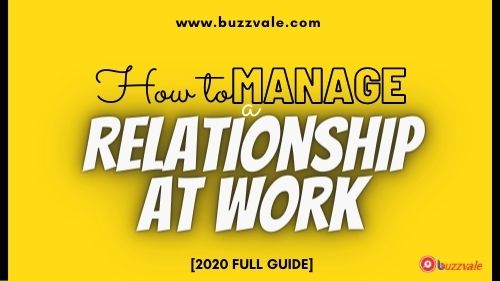How to Manage a Relationship at Work [2020 Guide]
Man is a social being, and part of that plays out in building a relationship at work. As much as workplace relationships may not be a threat, many employees struggle to develop a healthy one.
This article will look at what a relationship at work is and how to build one. Besides, as an employee or employer, how can you improve on existing workplace relationships?
Gallup published that employees with at least three vital friends at work are 96% more like to be very satisfied. According to a GMJ’s survey, 75% of workers agree that their organization commits to associate strength.
Whereas, these respondents have a friend at work with whom they share a new idea that springs up.7
Meanwhile, there are different types of work relationships, which we are still going to explore. However, for this article’s sake, we will focus on building a relationship at work.

What is Workplace Relationships?
Relationship at work refers to interpersonal relationships among individuals in an ordinary place of work. Besides, such relationships affect the involved individuals as well as the workplace.
A relationship at work can begin on its own, without a conscious effort from the individuals. However, when it happens, you should be aware of its impact on you and the workplace.
What kind of relationships can exist in the workplace?
7 Types of Relationships at Workplace
There are two broad classifications we can give a relationship at work. They include personal and professional relationships.
Personal relationships at work are those that meet your social needs and help to keep you sane. On the other hand, Professional relationships are strictly for the sake of doing your duties at your workplace.
In other words, you can achieve your business goals and advance your career through healthy professional relationships. More so, these relationships will not even exist in the first place without your job.
All relationships at work can fall into either of the two categories above, making them mutually exclusive. However, most importantly, people who are into relationships that fall into both categories often encounter diverse issues with maintaining them.
Depending on the levels of intimacy, we can further classify workplace relationships into seven types. As a result, the arrangement below ranks the relationship types from the most intimate to the least personal.
1. Life Friends
These are the most personal category of friends you can have at your workplace. Besides, they are the kinds of people with whom you can have the most intimate relationships.
You met at work at the start, but you could build a kind of relationship that would remain even after you no longer work together over time.
Moreover, these friends fill your social life with so much fun, love, care, and sometimes more.
These are the kinds of friends with whom you can build a romantic relationship. In other words, these relationships transcend what goes on at the office.
However, many companies frown at romantic relationships among staff for many reasons beyond this article’s scope.

2. Mentor-Mentee relationships
Next to life, friends are the mentor-mentee relationship at work, which is the most professional connection. Ideally, we tend to easily connect with whoever has attributes that are interesting to us.
Besides, some companies connect two or more people for such mentorship at work. At least, it is common in legal firms and other people-centered jobs. This relationship can serve you professionally, from most straightforward ideas to stringent career guidance and professional growth.
By definition, a mentor provides advice while the mentee goes to the former for guidance. The mentor walks the mentee through the office’s landscape, and the latter may need help for some time.
Besides, mentees may also need mentors in challenging times because they have probably had similar past problems. Therefore such workplace relationships are highly profiting in navigating the work challenges until you succeed.
A mentee must focus on getting mature enough to mentor others who may also need him. Again, this relationship at work can grow into a personal level under certain conditions.
3. Office Spouse
Having an office spouse may sound funny, but it is also a kind of relationship at work. An office spouse is a person you spend quality time with at work. So much so, the other colleagues must have been observing you two together.
In other words, rumors may fly now, and then you both are dating while nothing is happening. The people in this category are your go-to people in case of any issue or need for advice. Moreover, they keep your balance and are often dependable as friends.
Again, you can trust these with your emotional frustrations and imbalances because the relationship is often personal. Office spouses often understand you better at work.

4. Manager subordinate direct relationship
This relationship is strictly professional and cannot exceed the boundaries of the official assignments. This manager is the one that makes all the calls, and every other person does his bidding.
By keeping this relationship at work, he helps you grow into success while impacting the work environment. The vital part of these relationships is that it determines your score, salary, and workplan.
Moreover, your relationship with your manager (boss) will tell your job satisfaction. If you have reported directly, they help you achieve more with the company.
5. Work friends
Work friends from another kind of personal relationship at work where you can interact with others on a social level. You can lunch with these colleagues, talk at an office event, and run into them outside the office.
In some cases, you may handle similar issues together, and they may spice things up with a relaxed mood. If you are a good friend too, you should both meet each other’s social needs.
Besides, working in the same company can further enhance your intimacy, but the only use is office support. Workplace relationships that also involve personal work friends can be a way to go for healthy help.
6. Teammate or Team member
A teammate or a team member is a fellow employee connected by working together on a project. The workplace relationship may be daily, weekly, or continuous and include a team, committee, or group.
Moreover, many employees found out that team members are crucial to accomplishing anything as a team. With these teammates, you can plan, create, design, develop, and different executive roles. Your success in this relationship at work will mean more accomplished tasks for every team member.

7. Co-worker or colleagues
Co-workers are the least intimate of all workplace relationships but are often circumstantial. More notably, you usually don’t have anything in common to save the interaction in the office.
These people are acquaintances from the office with which you have the least interactions. On the other hand, these people may have little service except being in the staff pool.
Nurturing such a relationship at work can bring comfort and progress to the firm in the long run.
Importance of Workplace Relationships
At this point, we must admit that not all workplace relationships turn out to be profitable. For a start, some relationships can help to advance your career while others keep you in mental balance.
Unfortunately, others may have a detrimental effect on you, especially if things go south. Below are some of the top reasons why relationship at work can be beneficial:
1. Work and business can practically not exist without relationships.
Business goals are only achievable on the productivity of your relationships. For instance, the bonding among workers or employees and between employees and employers make the business thrive. Furthermore, sole proprietors also need to maintain a healthy relationship with customers to sustain the business.
2. All duties and roles hinge on healthy relationships at work.
Apart from the nature of business running as an essence for relationships, workers need healthy workplace relationships. Irrespective of the role you place at work, an ordinary root skill is a relationship. For instance, customers, clients, colleagues, superiors, instructors, supervisors, team leaders, receptionists, partners, investors, and others all require relationship skills.
3. Relationships at work can help the worker’s productivity.
Many statistical findings proved that strong relationships often lead to better work through workers’ job satisfaction. For one, stronger relationships mean a better internal organization. Moreover, some recent studies show that these relationships strengthen morale, productive conversations, and more engagements. For marketing departments, sales reps can make more sales through sound customer relationship management.
4. Healthy relationships are good for your health.
According to Health Psychology and Behavioral Medicine research, volunteers agreed that work interactions enhanced workers’ feelings of well-being. Also, it increased the energy levels at work and home while giving the individual a healthy emotion and job perception. Some of the characteristics of these healthy relationships include mutual trust, understanding, and respect. Besides, apart from mental health, they also influence your physical health, including general well-being and life span. Studies proved that people with social circles and healthy relationships live longer and respect stress more than others. Besides, such people maintain a more robust immune system that helps them combats health issues.

10 Ways to Manage a Relationship at Work
As a manager or a worker in an establishment, we discussed what workplace relationships entail. However, what exactly do you need to do to build and nurture a profitable relationship?
1. People Skills
One of the topmost skills you need in an office environment is people skills. Also, people skills include communication, leadership, collaboration, and conflict resolution. Whether as a leader at work or not, you should be conscious of what you do as it rubs on other people.
Furthermore, employers also look out for your ability to dwell peacefully with other people. In other words, this skill is indispensable in building bonding that grows in intimacy.
2. Don’t live to please others
Some people think it is a way to maintain relationships, but it does not nurture the right ones. As much as you should not take advantage of others, no one should take advantage of you. If an answer is no, feel free to say no to the wrong people
3. Inspire others
Others watch you and can tell whether you are excited or not. More so, your emotions are contagious and affect others. Whether conscious of it or not, you influence other people.
However, when doing that, maintain your boundaries. For instance, in workplace relationships, separate your family from work-life.
Let the time for work also be separate from the time to discuss personal issues or catch fun. Over time, people will learn to respect your boundaries and probably imbibe similar ideas.
4. Add, not subtract. Give, don’t take
Relationships are nurtured when you look forward to giving and not receive. Always look forward to adding to others and contribute positively, rather than bringing negative energy. More so, be the answer that people need.
When people come to you, let them look forward to getting something highly profitable. Your relationship at work is your magic to win the hearts and affection of others.
5. Be Positive and Avoid dream chokers
Know the people from which positive energy come and associate with them more than others. Don’t seek flattery but stay around those who sustain your passion and joy, not depressed or jealous folks.
No one likes to stay around negative people, so you don’t want to be a negative person. Even in the face of tough times, maintain a lively atmosphere, and stay calm to find a solution.
More so, your positive energy, especially as a leader, is not only for you but for others also. However, stay in the realistic circle without undermining or overrating what is at stake.

6. Emotional Intelligence
Being emotionally intelligent is often the needed joker to unlock relationships and stay in touch with others. Self-centredness is a significant problem in relationships between two people.
However, emotional intelligence will demand beyond your well-being to that of others. You can decode their feelings through higher sensitivity.
See beyond the face. In selfless giving, you can easily see beyond people’s words to know how they are feeling.
Many times, you may have to solve the underlying problems before addressing what is on the surface. Besides, learn to empathize with others in tough times and give them priority.
Pick up helpful cues from people’s expressions even if they try to hide it and offer them sincere help.
7. Always Show Appreciation
Being grateful puts a smile on the face of others. That is, let people know that you are thankful for their effort and help.
Moreover, this gratitude should not only be towards superiors but even subordinates, including janitors and cleaners.
Besides, public appreciation can do the magic at times, right among other staff members. Also, you can go beyond verbal appreciation to expression through gifts.
8. Take time to build relationships
Good relationships take time investment. Therefore, all parties who will like to build a profitable relationship at work must keep this sacred law.
If you admire people, you naturally spend time with them. Beyond that, since it is a work environment, you can choose other times to relate and bond more.
Beyond the demands of the job, invest your time into workplace relationships for the sake of the future.
Create time for social gatherings and hangouts. At times, you may need to offload some duties at work. This way, some companies learned to outsource some parts of their services to other firms.
For instance, Square ship can handle your marketing, recruitment, Slack for communication, Asana for project management, and others.
9. Listen to others
A lot of leaders at workplaces think relationships are about doling out instruction to others. No. leadership, especially at workplaces, cannot work except you develop listening skills.
Mind you, listening goes beyond nodding or giving one-word responses. Ask relevant questions, restate some parts of the discussion to stay on track with the flow.
Furthermore, find or create an environment to receive what the other person has. Make an active effort to understand their point without interruption.
More so, respond to people after they pause or stop talking in clear but simple terms. Finally, never forget what people discuss with you.
If you quickly forget, tell them to allow you to scribble a few things down without breaking their flow. In other cases, you may recall some of the discussed points after the conversation is over.
However, active listening is learnable, and it may take some time but is well attainable.
10. Be consistent and confidential
These two related skills are about building trust in conversations and relationships. Many of your workplace relationships cannot thrive in the absence of faith.
In other words, people want to feel secure sharing with you, and they want to know your consistency in life.
The aspect of consistency deals with the fact that you maintain the same positive, encouraging, and profitable vibe.

Summary
In conclusion, there are several ways to maintain a relationship at work profitably. However, these ways demand to know what a workplace relationship is and the roles to play. This article discusses the seven types of workplace relationships and ten ways to manage a relationship at work.
[sc_fs_multi_faq headline-0=”h2″ question-0=”What are the types of relationships at work?” answer-0=”Relationships at work can be personal or professional. But on the basis of intimacy, it can be divided into 7 other types” image-0=”” headline-1=”h2″ question-1=”how many relationships start at work?” answer-1=”Statistics show that more than 50% of workers have experienced relationships at work” image-1=”” headline-2=”h2″ question-2=”do work relationship work?” answer-2=”Yes, a relationship can work at workplaces provided it is not against the office rules” image-2=”” headline-3=”h2″ question-3=”how can you manage work relationships?” answer-3=”There are people management skills that help to manage a workplace relationship” image-3=”” headline-4=”h2″ question-4=”how can you build a relationship at work?” answer-4=”Most work relationships will happen on their own but it takes conscious efforts to sustain them” image-4=”” count=”5″ html=”true” css_class=””]








